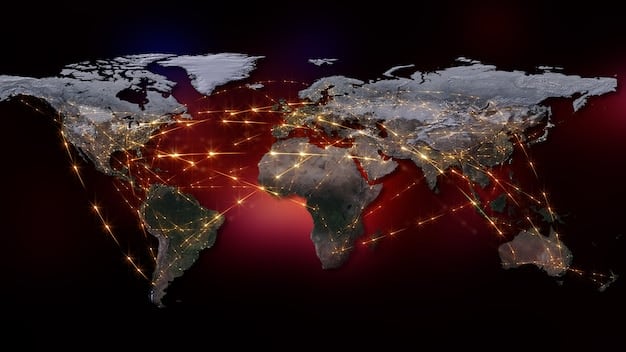US Companies Prepare for Updated International Data Transfer Laws in 2025

US companies must prepare for updated international data transfer laws taking effect in January 2025 by understanding new compliance requirements, assessing current data practices, and implementing necessary security measures.
As the calendar inches closer to 2025, US Companies: Are You Prepared for the Updated International Data Transfer Laws Taking Effect in January 2025? The implications of these changes are far-reaching, affecting how businesses handle data across borders.
Understanding the Current Landscape of International Data Transfer Laws
International data transfer laws are a complex web of regulations that govern how personal data is transmitted and processed across borders. These laws are crucial for protecting individual privacy rights and ensuring that data is handled securely, regardless of where it is stored or processed.
Currently, several frameworks are in place to regulate international data transfers, each with its own set of requirements and nuances. Understanding these frameworks is essential for US companies engaged in global business operations.
Key International Data Transfer Frameworks
Navigating the complexities of international data transfer laws requires understanding several key frameworks.
- General Data Protection Regulation (GDPR): The GDPR, enacted by the European Union, sets a high standard for data protection and privacy, impacting any company that processes the personal data of EU residents.
- California Consumer Privacy Act (CCPA): CCPA grants California residents significant rights over their personal data, including the right to know, the right to delete, and the right to opt-out of the sale of their data, influencing data protection practices nationwide.
- Standard Contractual Clauses (SCCs): SCCs are standardized contractual terms approved by the European Commission, providing a mechanism for organizations to transfer personal data from the EU to countries outside the EU in compliance with GDPR.
These frameworks collectively shape the landscape of international data transfer, mandating stringent data protection measures and compliance protocols for businesses operating globally.
How the Updated Laws Will Impact US Companies
The updated international data transfer laws represent a significant shift in the regulatory landscape, introducing more stringent requirements and broadening the scope of data protection. These changes are poised to have a profound impact on US companies that engage in international data transfers, necessitating a thorough review of current data practices and compliance strategies.
US companies must understand the specific provisions of the updated laws and how they differ from existing regulations to ensure compliance and mitigate potential risks.

Specific Provisions of the Updated Laws
The updated international data transfer laws introduce several key provisions that US companies must be aware of.
- Enhanced Data Security Measures: The updated laws mandate more robust data security measures, including encryption, access controls, and regular security audits, to protect personal data from unauthorized access and breaches.
- Stricter Consent Requirements: The new regulations impose stricter consent requirements for data collection and processing, requiring companies to obtain explicit consent from individuals before collecting or using their personal data.
- Increased Accountability and Transparency: US companies will face increased scrutiny regarding their data processing activities, with the updated laws requiring greater transparency and accountability in how data is handled and transferred.
These provisions collectively raise the bar for data protection, requiring US companies to adopt more comprehensive and proactive approaches to data governance and compliance.
Steps US Companies Can Take to Prepare
Preparing for the updated international data transfer laws requires a proactive and strategic approach. US companies need to take concrete steps to assess their current data practices, identify potential compliance gaps, and implement necessary changes to ensure they are ready for the new regulations.
By taking these steps, US companies can minimize the risk of non-compliance and demonstrate their commitment to protecting personal data.
Conducting a Data Audit
A essential step in preparing for the updated laws. This involves a comprehensive review of your organization’s data processing activities to identify the types of personal data you collect, where it is stored, how it is used, and with whom it is shared.
Implementing Data Security Measures
This involves implementing technical and organizational measures to protect personal data from unauthorized access, use, or disclosure. These measures may include encryption, access controls, intrusion detection systems, and regular security audits.

The Role of Data Protection Officers (DPOs)
Data Protection Officers (DPOs) play a crucial role in helping organizations navigate the complexities of data protection laws. As experts in data privacy and compliance, DPOs are responsible for overseeing an organization’s data protection strategy, ensuring compliance with relevant regulations, and serving as a point of contact for data protection authorities and individuals.
Under the updated international data transfer laws, many US companies may be required to appoint a DPO. Even if not legally mandated, having a DPO can be a valuable asset in ensuring compliance and fostering a culture of data protection within the organization.
Responsibilities of a Data Protection Officer
Key responsibilities include:
- Monitoring Compliance: Ensuring that the organization’s data processing activities comply with relevant data protection laws and regulations.
- Providing Guidance: Advising the organization on data protection matters, including risk assessments, data protection impact assessments (DPIAs), and the implementation of data protection policies and procedures.
- Training Employees: Conducting training programs to educate employees about their data protection responsibilities and the importance of data privacy.
By fulfilling these responsibilities, a DPO helps organizations to effectively manage data protection risks and demonstrate their commitment to data privacy.
Leveraging Technology for Compliance
Technology can play a crucial role in helping US companies comply with the updated international data transfer laws. By leveraging the right tools and solutions, companies can automate many of the tasks associated with data protection, improve data security, and streamline compliance efforts.
From data discovery and classification to data loss prevention and consent management, technology can empower US companies to meet the challenges of the updated regulations more effectively.
Essential Technologies for Data Transfer Compliance
There are several types of technologies that can assist US companies in complying with international data transfer laws.
- Data Discovery and Classification Tools: These tools can help companies identify and classify personal data across their systems, enabling them to understand what data they have, where it is stored, and how it is used.
- Data Loss Prevention (DLP) Solutions: DLP solutions can prevent sensitive data from leaving the organization’s control, reducing the risk of data breaches and unauthorized disclosures.
- Consent Management Platforms (CMPs): CMPs can help companies obtain and manage user consent for data collection and processing, ensuring compliance with consent requirements under GDPR and other privacy laws.
These technologies can streamline compliance efforts and to minimize the risk of non-compliance.
The Potential Consequences of Non-Compliance
Failure to comply with the updated international data transfer laws can have serious consequences for US companies. From hefty fines and legal liabilities to reputational damage and loss of customer trust, the risks of non-compliance are significant.
US companies must take these potential consequences seriously and prioritize compliance with the new regulations to protect their businesses and their customers.
Financial Penalties and Legal Liabilities
Financial penalties under GDPR and other data protection laws can be substantial, reaching millions of dollars or a percentage of a company’s annual global revenue. In addition to fines, companies may also face legal liabilities, including lawsuits from individuals whose data has been compromised.
Reputational Damage and Loss of Customer Trust
A data breach or compliance failure can severely damage a company’s reputation and erode customer trust. Customers are increasingly concerned about data privacy and security, and they are more likely to do business with companies that demonstrate a strong commitment to data protection.
| Key Aspect | Brief Description |
|---|---|
| 🔑 Understanding the Laws | Key frameworks include GDPR, CCPA, and SCCs. |
| 🛡️ Enhanced Security | Implement robust security measures like encryption and access controls. |
| 💼 DPO’s Role | Data Protection Officers oversee data protection strategy and compliance. |
| 💸 Non-Compliance Risks | Fines, legal liabilities, and reputational damage. |
FAQ Section
International data transfer laws are regulations governing the transmission and processing of personal data across national borders, ensuring data protection.
Updated laws introduce stricter requirements for data security, consent, and accountability, requiring companies to reassess data practices.
Companies should conduct data audits, implement security, update agreements, and appoint a DPO. These steps enhance compliance and security.
A DPO oversees data protection strategy, ensures compliance, and serves as a contact for data protection authorities and individuals.
Non-compliance can result in hefty fines, legal liabilities, reputational damage, and loss of customer trust; compliance is critical.
Conclusion
As the updated international data transfer laws approach in 2025, US companies must proactively prepare for these changes. By understanding the regulatory landscape, taking concrete steps to ensure compliance, and leveraging technology to streamline data protection efforts, companies can minimize risks, protect their businesses, and maintain the trust of their customers.





